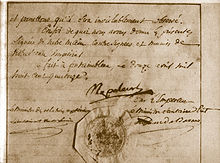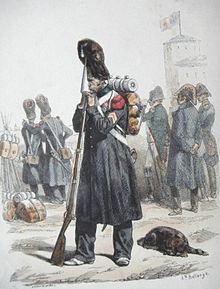|
Napoleon I's first abdication Napoleon I's first abdication was a moment in French history when, in April 1814, the French emperor Napoleon I was forced to relinquish power following his military defeat in the French campaign and his allies’ invasion. Military and political circumstancesDisagreeing with Tsar Alexander I over the future of Poland, Napoleon decided in 1812 to march against the Russian Empire. The Grande Armée crossed the River Neman in June and marched towards Moscow. To counter this aggression, a Sixth Coalition was formed between the United Kingdom of Great Britain and Ireland, the Russian Empire, the Kingdom of Prussia, and the Empire of Austria. Defeated by his adversaries and by harsh climate conditions, Napoleon was forced to make a retreat from Russia. Pushing their advantage against a weakened adversary, the coalition forced Napoleon to launch the German campaign in 1813. Victorious in the “Battle of the Nations” (Leipzig, October 1813) and outnumbered, the Coalition armies set off for France on December 15.[1]  To the south, on the Iberian front, the situation was not much better: the Pyrenees offensive, launched on July 25 under the command of Marshal Soult, ended on August 2 with the withdrawal of the French army from the region and the entry into France of the troops of Arthur Wellesley, Duke of Wellington. The French campaign was now underway.[1] Despite a series of victories (battles of Champaubert, Montmirail, etc.) won by Napoleon at the head of an army of young, inexperienced recruits (the “Marie-Louises”), Paris - which Empress Marie-Louise had left the day before - fell on March 31 after a day of fighting, while the Emperor awaited the Allies at Fontainebleau. He then instructed his grand squire Caulaincourt to negotiate with Tsar Alexander I, who was staying with Talleyrand on rue Saint-Florentin. Caulaincourt negotiated an abdication in favor of the King of Rome, Napoleon's 3-year-old son. The Tsar was not opposed, but on learning of the defection of Marshal Marmont, who had been placed in the vanguard at Essonnes, he imposed unconditional abdication on Napoleon, who was now in the open.[1] Treaty and legislative acts leading to Napoleon's destitution (April 3-12, 1814) After his military defeat, the marshals forced the Emperor to abdicate. In order not to trigger a civil war, Napoleon gave in after unsuccessful attempts to rally them and was deposed by the Senate on April 3. Napoleon intended to relinquish the imperial crown to his son (Napoleon II), but the Allied powers demanded an unconditional abdication, which he signed on April 6, 1814.[1] The Senate named Louis-Stanislas-Xavier de Bourbon “King of the French, according to the wishes of the nation”, under the name of Louis XVIII, and Napoleon was exiled.[1] As the Tsar had promised a settlement outside France worthy of Emperor Napoleon, he proposed Corsica to Caulaincourt, who refused, as it was an integral part of the French nation, and asked for Sardinia. Alexander I in turn rejected the proposal, as the island belonged to the House of Savoy (Kingdom of Piedmont-Sardinia). He chose the island of Elba, a dependency of Tuscany. The Treaty of Fontainebleau of April 11, 1814, stipulates that Napoleon retains his title of Emperor,[note 1] and receives full sovereignty over Elba along with an annuity of 2 million francs from the French government.[1][2] Suicide attempt Napoleon, who believed that the Allies would separate him from Empress Marie-Louise of Austria and their son, the King of Rome, took a dose of “Condorcet's poison” on the night of April 12/13, which he hoped would be the means of committing suicide. For a long time, it was thought to be opium in a little water, with Dr. Hillemand believing that it was an accidental over-intake of opium to soothe abdominal pain.[3] It would appear, however, that this was not the case, as Napoleon's condition and the nature of his discomfort were not consistent with opium intoxication.[4] He called Armand de Caulaincourt to dictate his last wishes.[5] In the midst of his illness, the Emperor complained of the slow effect of the substance he had swallowed. He declared to Caulaincourt: “It's so hard to die, it's so unfortunate to have a constitution that postpones the end of a life that I can't wait to see the end!"[6] Napoleon's nausea became increasingly violent, and he began to vomit. When Dr Alexandre-Urbain Yvan arrived, Napoleon asked for an extra dose of poison, but the doctor refused, saying that he was not a murderer and would never do anything against his conscience. The doctor himself had a nervous breakdown, fled on horseback, and was never seen again. As the Emperor's agony continued, Caulaincourt left the room to ask the chamber valet and the internal service to remain silent. Napoleon called Caulaincourt back, telling him he'd rather die than sign the treaty. The effects of the poison then wore off, and he was able to resume his normal activities.[note 2] Departure from FranceFontainebleau farewells
The “Fontainebleau Farewells” took place on April 20.[7][2] Route to exile His convoy from Fontainebleau to the Mediterranean passed through royalist Provençal villages, which booed him, before embarking for Elba. He even risked being lynched in Orgon, forcing him to disguise himself.[8] On April 18, 1814, Count Pierre Dupont de l'Étang, Louis XVIII's Minister of War, sent a letter to General Jean-Baptiste Dalesme, who governed Elba on behalf of the Grand Duchess of Tuscany, Elisa Bonaparte, informing him that he must hand over the territory to Napoleon. The Emperor left Saint-Raphaël on April 29, 1814, aboard the English frigate Undaunted, reached Portoferraio on May 3, 1814, and disembarked the following day.[9] On the same day, Louis XVIII entered Paris.[1] Empress Marie-Louise initially offered to join her husband, but after meeting her father, Emperor Francis I of Austria, decided to travel to Vienna with her son.[1] Political and military consequencesPolitical consequencesMilitary consequencesAfter his restoration, Louis XVIII quickly decided to reorganize the army. He confirmed General Dupont as Minister of War. A royal decree of May 6, 1814, set up a war council to reorganize the army. It was made up of Marshals Ney, Augereau, and Macdonald, Minister Dupont, Generals Compans and Curial for the infantry, Latour-Maubourg and Préval for the cavalry, Sorbier and Évain for the artillery, Léry for the engineers, Kellermann for the guard, Commissary Marchand and revenue inspector Félix.[1] The ordinance of May 12 reorganized the infantry, increasing the number of line infantry regiments to 90 and light infantry regiments to 15.[1] Exile in Elba and return to France (Hundred Days) “Operetta kingdom”
  Last return to FranceOn March 1, 1815, the deposed Emperor disembarked at Vallauris at the head of the small troop that had followed him into exile. This marked the beginning of what history would remember as the “Hundred Days”, which led to the formation of the Seventh Coalition that eventually defeated Napoleon I at the Battle of Waterloo, resulting in his final abdication and exile to the island of St. Helena, where he died in May 1821.[1] See alsoNotes
References
Bibliography
|
